Overview
This article focuses on the essential medical shipping supplies that healthcare providers require to ensure the safe and efficient delivery of medical products. It highlights various suppliers and their offerings, emphasizing the critical importance of compliance with regulations, innovative packaging solutions, and the integration of technology. These elements are vital for enhancing logistics and operational efficiency within the medical supply chain. By understanding and utilizing these resources, healthcare providers can significantly improve their supply chain management, ensuring reliability and safety in their operations.
Introduction
The intricate world of medical shipping supplies is vital for healthcare providers, ensuring that essential resources are delivered safely and efficiently. As healthcare logistics become increasingly complex, understanding best practices and identifying key suppliers can significantly enhance operational effectiveness and improve patient care. However, navigating the myriad options and compliance requirements can be daunting. Therefore, it is crucial to identify the essential medical shipping supplies that every healthcare provider should prioritize to meet these challenges head-on.
Western Packaging: Integrated Packaging Solutions for Medical Shipping
Western Packaging delivers comprehensive solutions for medical shipping supplies meticulously tailored for healthcare shipping. Their offerings include:
- Expert packaging design
- Filling services
- Robust third-party logistics (3PL[)
This unified approach](https://westernpkg.com) simplifies the supply chain, ensuring that medical shipping supplies are safely packaged and delivered efficiently, effectively addressing the unique challenges faced by medical professionals. By integrating design and logistics in one location, Western Packaging significantly reduces lead times and enhances product delivery, solidifying its reputation as a trusted partner in the medical field. The emphasis on innovative packaging design and customized solutions in medical shipping supplies is crucial for maintaining product integrity and complying with regulatory standards, ultimately benefiting both medical professionals and their patients.
McKesson: Reliable Source for Medical Shipping Supplies
McKesson stands as a trusted provider of a comprehensive range of medical shipping supplies, which include personal protective equipment (PPE), surgical tools, and diagnostic devices. With over 300,000 products available, McKesson ensures that medical providers have the essential resources necessary for delivering quality patient care. Their commitment to quality and efficiency positions them as a cornerstone in the supply chain, empowering health facilities to maintain operational readiness. In a landscape where reliability is paramount, McKesson's extensive offerings and unwavering dedication make them an indispensable partner in healthcare logistics.
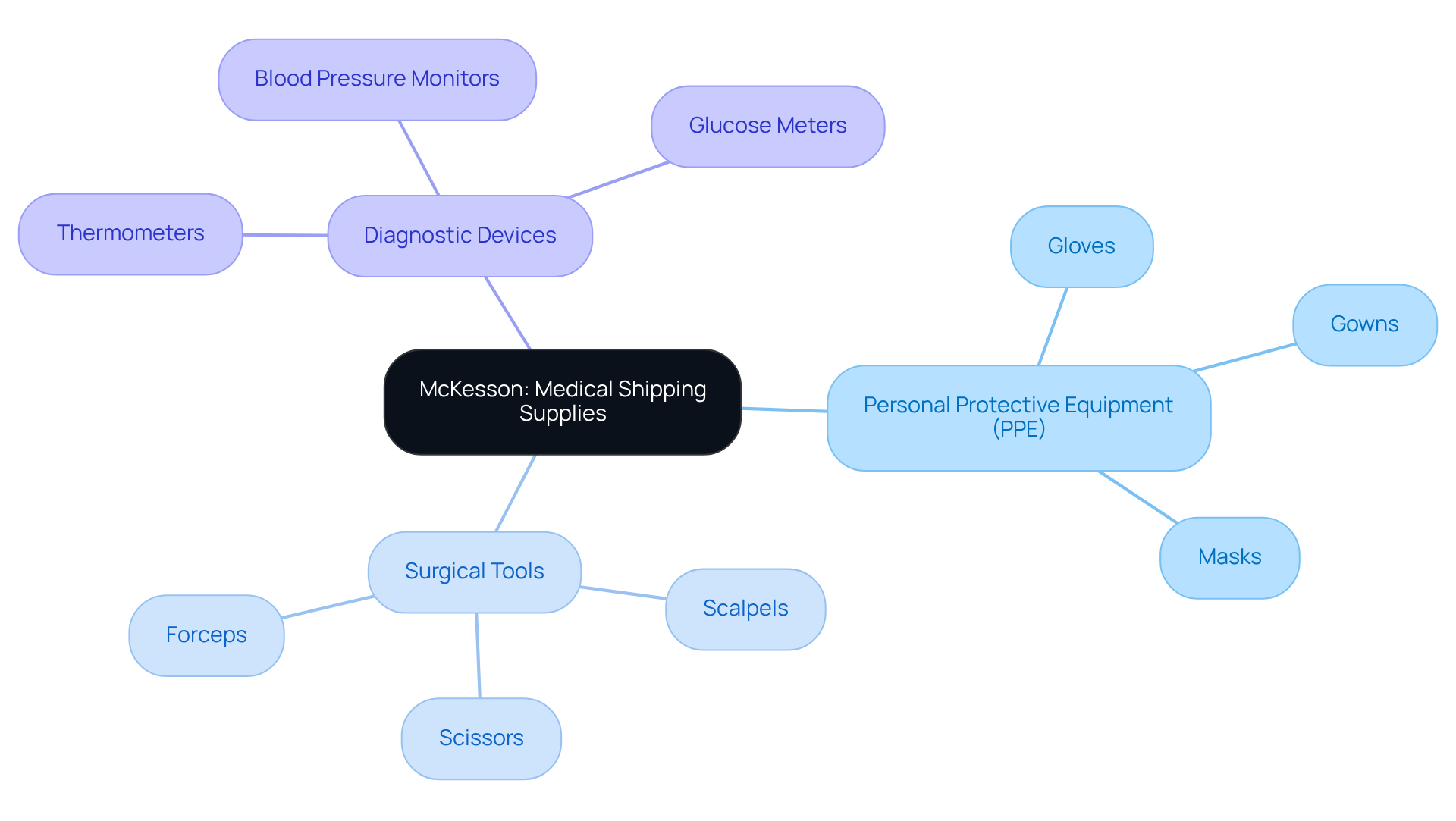
Creopack: Best Practices for Shipping Medical Equipment
Creopack underscores the critical importance of temperature-controlled and impact-resistant medical shipping supplies for the transportation of healthcare equipment. Best practices encompass selecting suitable materials, ensuring accurate labeling, and complying with regulatory requirements. By following these guidelines, practitioners can significantly mitigate the risk of damage during transport and ensure that devices arrive in optimal condition, ready for immediate use.
Temperature-controlled packaging solutions utilize materials such as polystyrene and polyurethane foam to maintain specific temperature ranges, which is essential for preserving the integrity of sensitive healthcare devices. The cold chain packaging market size is projected to reach USD 34.28 billion in 2024, reflecting the increasing demand for effective cold chain solutions within the industry. Experts emphasize that reliable temperature control is crucial for preventing spoilage and ensuring the efficacy of pharmaceuticals and biologics during transit, with certain products necessitating extreme temperature ranges of -35°C to -25°C, allowing for variances of 5°C or less.
Looking ahead to 2025, advancements in temperature-controlled packaging are anticipated to center around the integration of smart technologies, such as time-temperature indicators and RFID technology, to enhance safety and compliance. These innovations will empower caregivers to monitor conditions throughout the shipping process, ensuring that instruments arrive in prime condition, prepared for swift deployment. By adhering to these best practices for medical shipping supplies, medical professionals can substantially reduce the risk of harm during transport, ultimately improving patient care and operational efficiency.
Xpressman Trucking & Courier: Compliance-Focused Medical Supply Shipping
Xpressman Trucking & Courier specializes in providing compliance-oriented medical shipping supplies for healthcare products. Their services are meticulously designed to meet stringent regulatory requirements, ensuring that all shipments adhere to health and safety standards. By prioritizing compliance, Xpressman assists medical practitioners in avoiding potential legal issues and guarantees the secure delivery of medical shipping supplies.
For instance, medical organizations that have adhered to regulatory standards have successfully navigated complex legal landscapes, thereby enhancing their operational efficiency and maintaining patient safety. Xpressman Trucking underscores that comprehending and maneuvering through the regulatory environment is crucial for medical providers. Their unwavering focus on compliance not only mitigates risks but also enhances the overall quality of healthcare delivery. By ensuring that all medical shipping supplies comply with the necessary regulations, Xpressman plays an indispensable role in the success of healthcare logistics, ultimately contributing to improved patient outcomes.
As the healthcare delivery market continues to evolve, the significance of dependable logistics partners like Xpressman becomes increasingly apparent. Their proficiency in handling compliance issues is essential, particularly as the market is projected to expand at a CAGR of 8.2% from 2024 to 2032, driven by the rising demand for prompt and secure delivery of healthcare supplies.
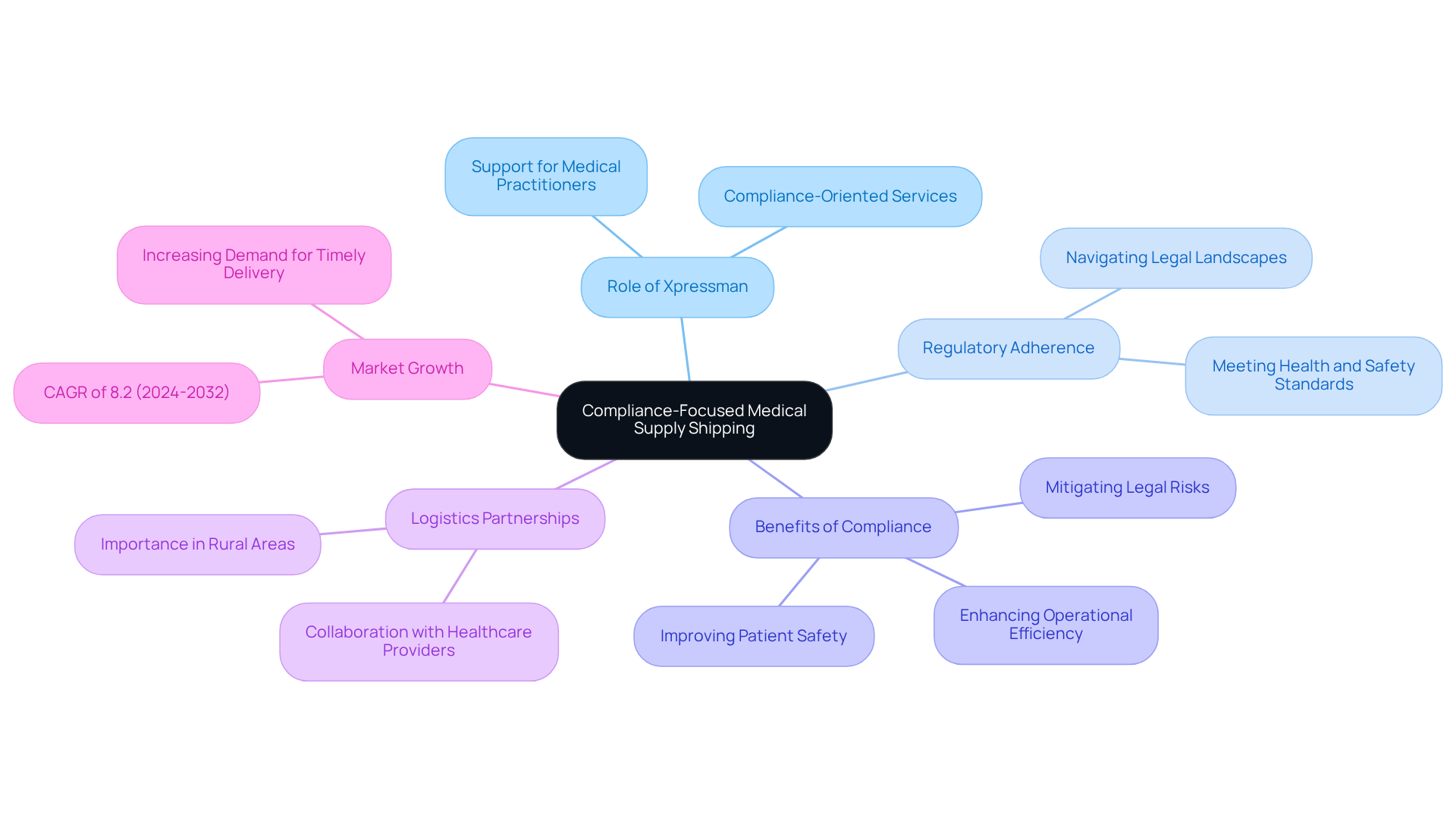
GWP: Expert Guidance for Shipping Large Medical Equipment
Professional advice is indispensable for the secure transportation of large healthcare equipment, particularly when selecting the appropriate packaging materials and techniques. Custom crates are highly recommended, as they offer tailored protection for sensitive devices. Furthermore, it is crucial to ensure that equipment is securely fastened within the packaging to prevent movement during transit, which can result in damage.
By integrating Western Packaging's filling services, suppliers can significantly enhance the safety of their devices during transportation. Additionally, leveraging our comprehensive 3PL solutions can streamline the logistics process, ensuring efficient transportation while minimizing the risk of costly repairs or replacements.
By adhering to these best practices, service providers can transport large healthcare equipment both efficiently and safely.
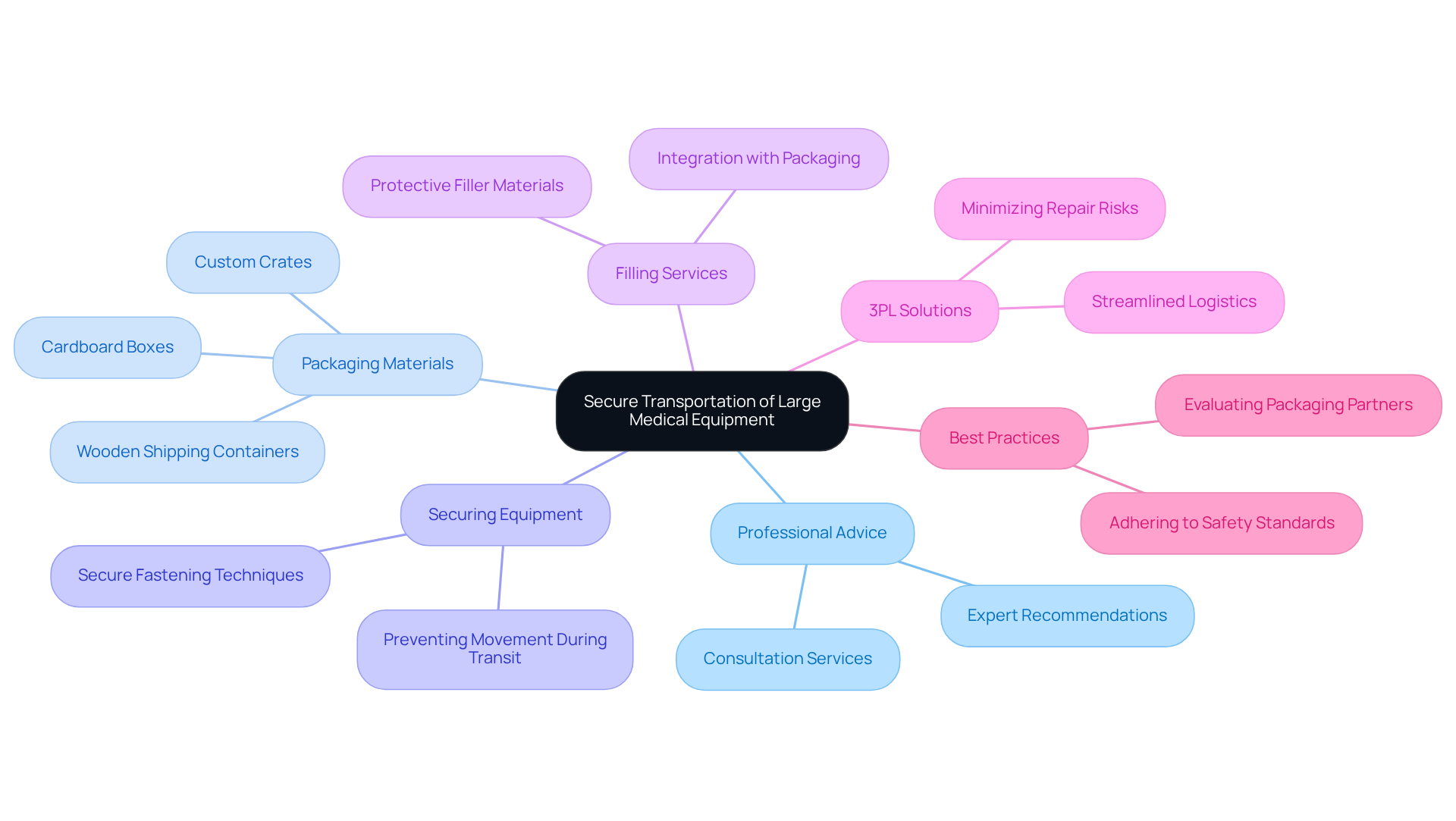
CalRecycle: Sustainable Packaging Solutions for Healthcare Shipping
CalRecycle stands at the forefront of promoting sustainable packaging solutions for medical shipping supplies, advocating for the adoption of recyclable and compostable materials. Their initiatives are meticulously designed to significantly reduce plastic waste and foster environmentally friendly practices within the medical supply chain. By embracing these sustainable packaging solutions, medical professionals not only comply with evolving regulations but also enhance their corporate social responsibility initiatives.
This shift is crucial, considering that the U.S. produces nearly 40 million tons of plastic waste annually, with only around five percent of this waste being recycled. The incorporation of recyclable materials into medical shipping supplies can lead to a reduced environmental impact and enhanced operational efficiency. Notably, medical service providers such as Cabinet Health have launched initiatives like nationwide pill bottle recycling programs, addressing the staggering estimated 165 billion plastic pill bottles that enter landfills and oceans each year.
As CalRecycle continues to champion these efforts, the medical sector stands to gain from an improved brand reputation and increased consumer trust, aligning with the growing demand for eco-friendly practices in the industry. Furthermore, the Biden-Harris Administration's strategy to eradicate all single-use plastic items in foodservice, packaging, and events by 2027 reflects broader regulatory trends impacting the medical sector.
The sustainable packaging market is projected to expand from USD 239.53 billion in 2024 to USD 498.29 billion by 2034, with a CAGR of 7.6%, highlighting the critical importance of adopting sustainable practices in medical shipping supplies within the healthcare sector.
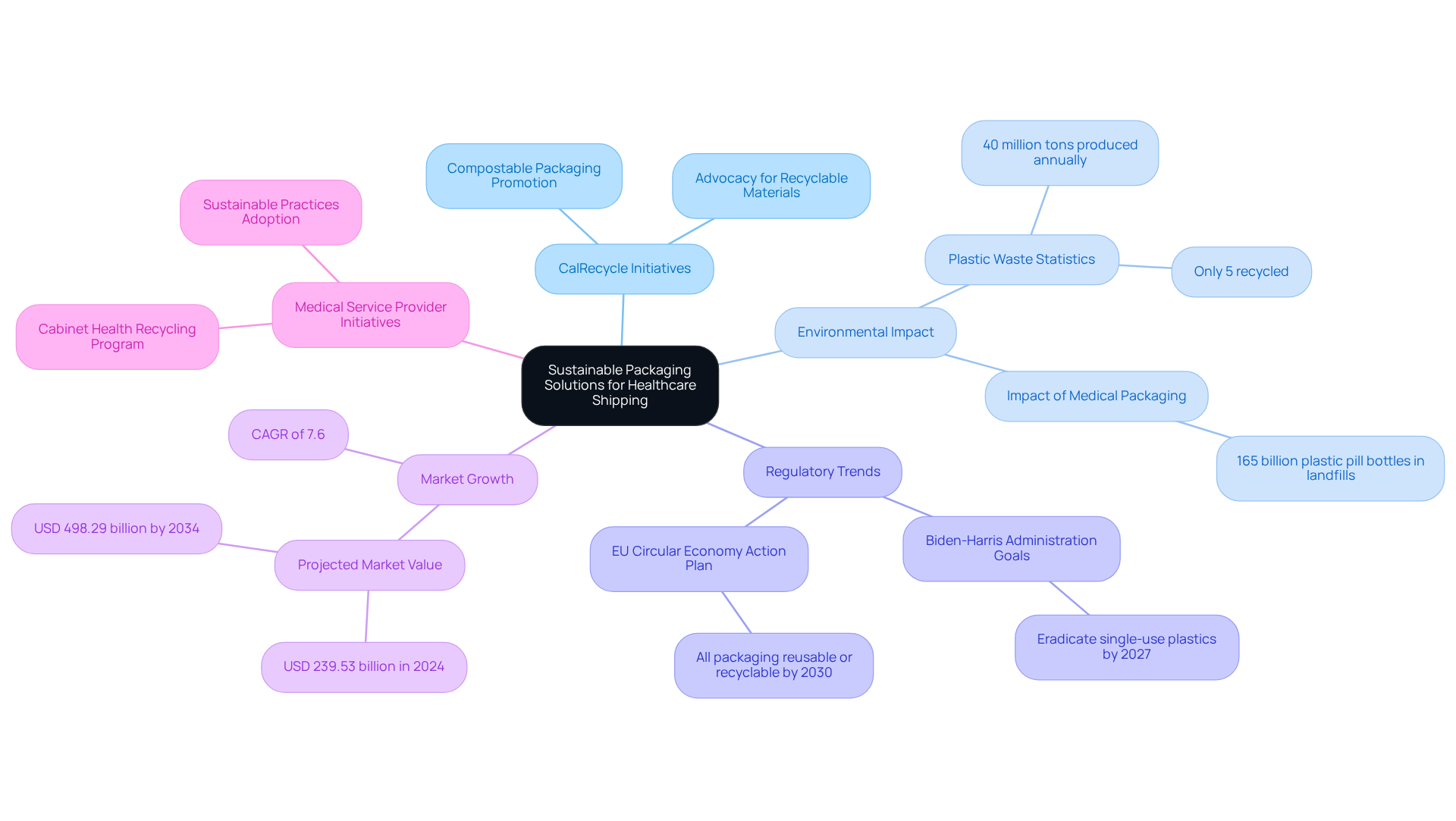
WHO: Global Logistics for Medical Supply Delivery
The World Health Organization (WHO) serves as a pivotal force in the coordination of global logistics for healthcare delivery, especially during health crises. Their logistics system ensures that essential health resources reach affected regions promptly and efficiently.
By delving into WHO's logistics strategies, healthcare practitioners can gain a deeper understanding of the intricate global distribution networks and the critical nature of timely health resource delivery. This knowledge not only enhances operational effectiveness but also underscores the significance of reliable logistics in safeguarding public health.
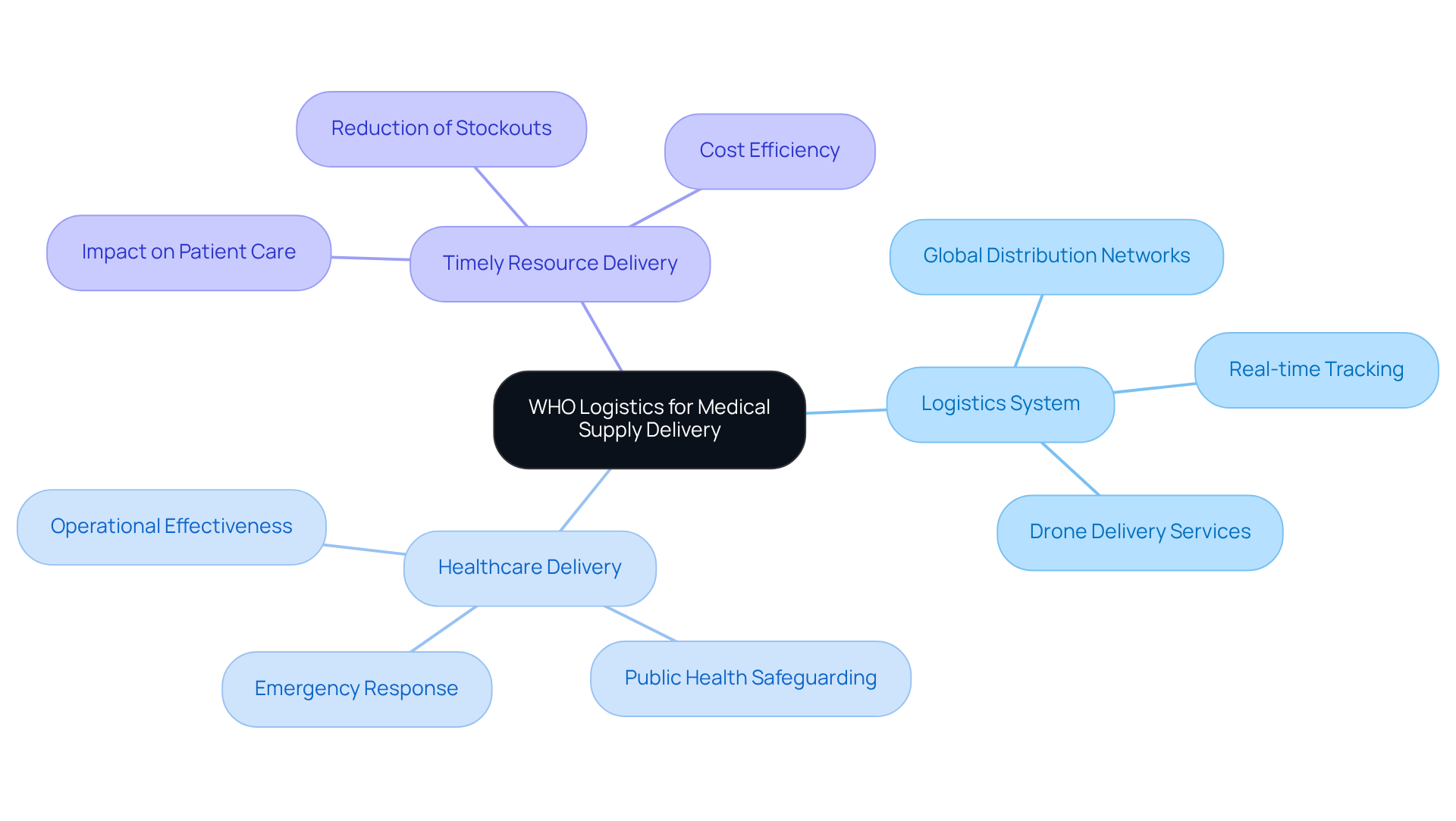
TSA: Guidelines for Transporting Medical Supplies
The Transportation Security Administration (TSA) enforces specific regulations for the transport of healthcare items, particularly concerning liquids and therapeutic devices. Healthcare professionals must familiarize themselves with these guidelines to facilitate seamless transit through security checkpoints. Following TSA guidelines not only reduces delays but also ensures that essential medical shipping supplies are delivered quickly and without issues.
For instance, TSA allows larger quantities of medically necessary liquids, gels, and aerosols, provided they are declared at the checkpoint. This flexibility is vital for healthcare professionals who frequently transport essential medical shipping supplies, such as insulin or nebulizer solutions, which are exempt from the standard 3-1-1 liquids rule when carried in reasonable amounts.
Furthermore, adherence to TSA guidelines is not just a question of convenience; it greatly affects the effectiveness of transporting medical shipping supplies. Organizations that exceed compliance standards enhance their operational performance and foster greater trust among stakeholders. As noted, exceeding compliance standards can improve a business's overall performance and make it more favorable to clients and investors.
Healthcare providers navigating TSA regulations have demonstrated that a proactive approach to compliance can streamline operations. For example, those who implement robust compliance frameworks, as emphasized in the case study "Importance of Compliance Framework," are better equipped to manage security practices effectively, reducing the risk of costly delays or breaches. By remaining knowledgeable and adjusting to changing regulations, health organizations can guarantee that their resources arrive at their destinations effectively and safely.
Uber Health: Innovative Transportation Solutions for Medical Supplies
Uber Health is revolutionizing the transportation of healthcare resources by offering on-demand delivery services tailored for health organizations. Their platform enhances the scheduling and monitoring of deliveries, ensuring resources arrive precisely when needed. By leveraging technology, Uber Health significantly boosts the availability of healthcare resources, ultimately improving patient care.
The influence of technology on medical supply delivery times is substantial. Automated systems optimize operational workflows, minimizing errors and increasing productivity. For instance, predictive tools evaluate potential disruptions, facilitating proactive decision-making that reduces delays. Consequently, medical providers can expect quicker delivery times, which are crucial for timely patient interventions.
Expert insights highlight the significance of these technological advancements. Many stakeholders recognize that integrating AI and real-time tracking systems not only improves delivery efficiency but also ensures compliance with stringent regulations in the medical sector. This integration is essential for safeguarding the confidentiality of sensitive medical information while enhancing logistics.
Real-world examples demonstrate how on-demand delivery services are transforming healthcare logistics. For instance, hospitals utilizing Uber Health have reported enhanced coordination in resource management, leading to swifter response times during emergencies. This capability is particularly beneficial in scenarios where time-sensitive medical resources, such as vaccines or lab samples, are urgently required.
The numerous benefits of on-demand delivery for medical organizations include the availability of medical shipping supplies. By reducing lead times and improving chain visibility, these services enable medical practitioners to focus on patient care rather than logistical challenges. Moreover, the ability to adapt quickly to changing demands enhances overall operational efficiency, making the supply of medical shipping supplies a critical component of modern medical logistics. Notably, 67 percent of providers report that their teams spend over 10 hours weekly addressing supply chain issues and shortages, underscoring the operational efficiency gains these services offer. Furthermore, with the Medical Supply Delivery Services Market projected to surpass US$ 52.4 billion, the significance and potential of on-demand delivery services in medical logistics are undeniable.
CVM at MSU: Specialized Shipping Solutions for Veterinary Medical Supplies
The College of Veterinary Medicine at Michigan State University (CVM at MSU) delivers tailored shipping solutions designed specifically for medical shipping supplies related to veterinary products. Their offerings encompass pre-paid mailers and a steadfast commitment to adhering to stringent shipping regulations for biological materials.
By leveraging CVM's specialized shipping services, veterinary healthcare providers can guarantee the safe and efficient delivery of medical shipping supplies, which is crucial for maintaining high standards in animal healthcare. Compliance with these regulations not only bolsters the reliability of supply chains but also significantly enhances shipping efficiency, ultimately benefiting veterinary practices and their patients.
Take action today to ensure your veterinary practice operates with the utmost reliability and efficiency.
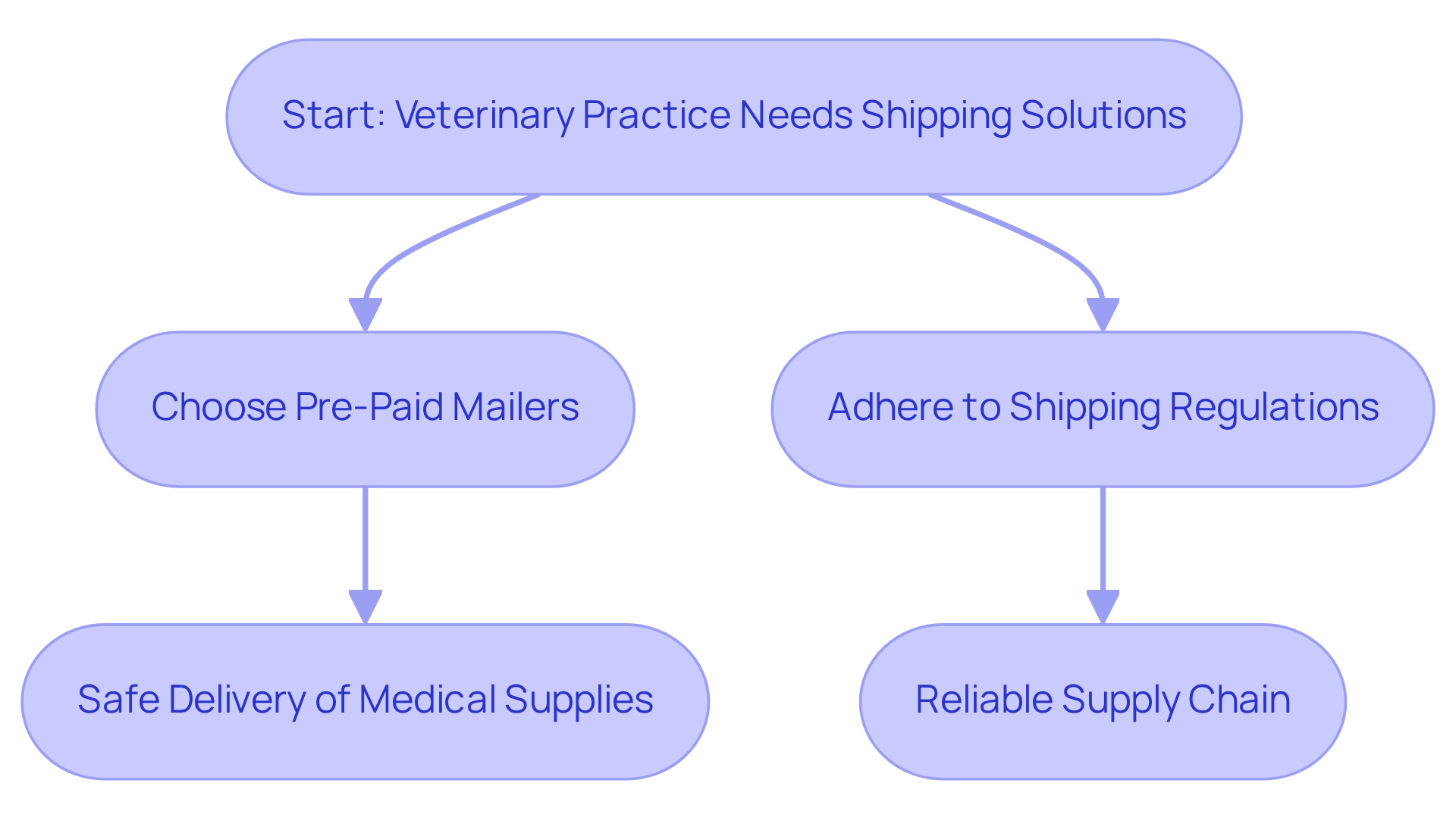
Conclusion
The landscape of medical shipping supplies is crucial for healthcare providers, ensuring that essential resources reach their destinations safely and efficiently. As the complexities of healthcare logistics continue to grow, understanding the key components and best practices becomes vital for enhancing operational effectiveness and improving patient care. Identifying and prioritizing these essential supplies not only addresses immediate logistical challenges but also fosters a more resilient healthcare system.
Throughout this article, several key suppliers and their contributions to medical shipping have been highlighted. From Western Packaging's integrated solutions to McKesson's extensive product range, each provider plays a pivotal role in supporting healthcare logistics. Best practices for shipping medical equipment, compliance-focused services from Xpressman Trucking, and sustainable packaging initiatives from CalRecycle further illustrate the multifaceted approach required to navigate this intricate field. Additionally, the importance of adhering to regulations set by entities like the TSA and the WHO underscores the critical nature of compliance in ensuring safe and timely deliveries.
As the healthcare sector evolves, embracing innovative solutions and sustainable practices in medical shipping will be paramount. Stakeholders are encouraged to take proactive steps in adopting these essential medical shipping supplies and practices to enhance operational efficiency and contribute to improved patient outcomes. By prioritizing reliable logistics and compliance, healthcare providers can ensure they are well-equipped to meet the demands of an ever-changing environment, ultimately fostering a healthier future for all.
Frequently Asked Questions
What services does Western Packaging offer for medical shipping?
Western Packaging provides expert packaging design, filling services, and robust third-party logistics (3PL) tailored for healthcare shipping.
How does Western Packaging improve the supply chain for medical shipping?
By integrating design and logistics in one location, Western Packaging simplifies the supply chain, reduces lead times, and enhances product delivery, addressing the unique challenges faced by medical professionals.
What is McKesson's role in medical shipping supplies?
McKesson is a trusted provider of a comprehensive range of medical shipping supplies, including personal protective equipment (PPE), surgical tools, and diagnostic devices, with over 300,000 products available to support healthcare providers.
Why is reliability important in healthcare logistics?
Reliability is paramount in healthcare logistics as it ensures that medical providers have the essential resources necessary for delivering quality patient care and maintaining operational readiness.
What best practices does Creopack recommend for shipping medical equipment?
Creopack emphasizes the importance of temperature-controlled and impact-resistant shipping supplies, selecting suitable materials, ensuring accurate labeling, and complying with regulatory requirements to mitigate damage during transport.
What materials are used for temperature-controlled packaging solutions?
Temperature-controlled packaging solutions typically utilize materials such as polystyrene and polyurethane foam to maintain specific temperature ranges essential for preserving sensitive healthcare devices.
What is the projected market size for cold chain packaging by 2024?
The cold chain packaging market size is projected to reach USD 34.28 billion in 2024, indicating increasing demand for effective cold chain solutions in the industry.
What advancements in temperature-controlled packaging are expected by 2025?
Advancements are anticipated to focus on integrating smart technologies, such as time-temperature indicators and RFID technology, to enhance safety and compliance in monitoring shipping conditions.
How can medical professionals reduce the risk of harm during transport?
By adhering to best practices for medical shipping supplies, such as using appropriate packaging and monitoring conditions, medical professionals can significantly reduce the risk of damage and improve patient care and operational efficiency.




